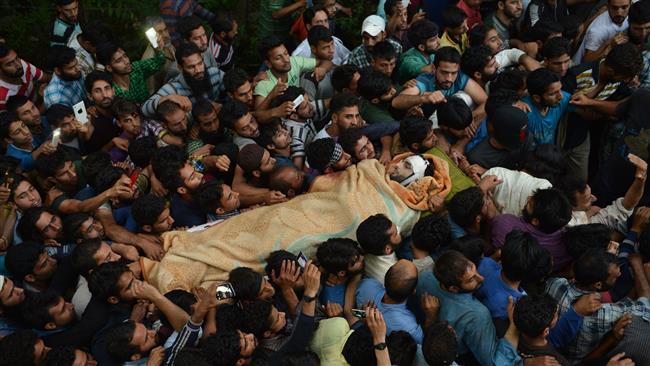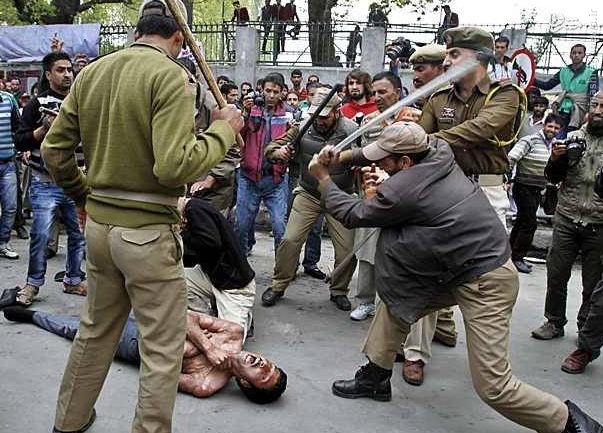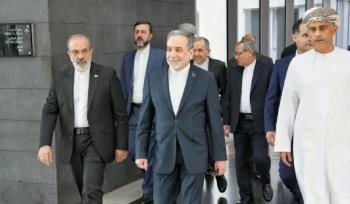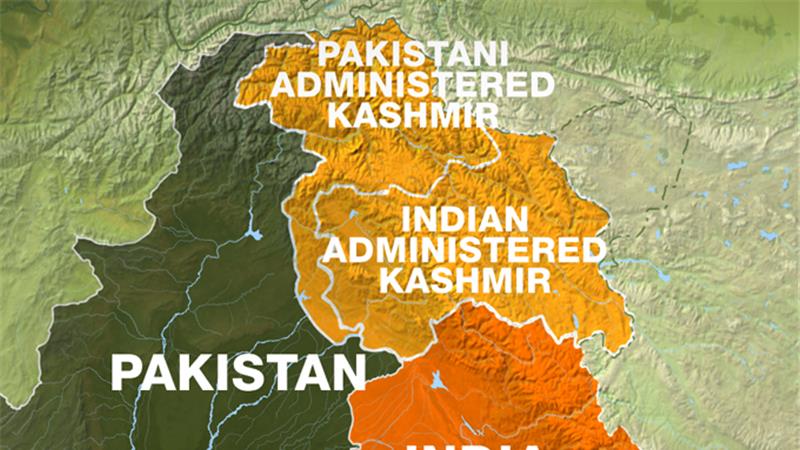Alwaght- India has rejected Pakistan's offer for talks on Jammu and Kashmir, where has been placed under curfew for 40 consecutive day.
Responding to Islamabad's invitation to hold special talks on the disputed issue of Kashmir, Indian High Commissioner said "there can be no dialogue amid provocations", according to india-based Times Now.
Pakistan had on August 15 handed over a letter to the Indian high commissioner formally inviting New Delhi for dialogue over the issue mainly-Muslim populated Kashmir.
Indian envoy to Pakistan Gautam Bambawale handed over Indian response to Pakistan Foreign Office.
A new round of tensions began on 8 July when a group of people protested the killing of “Burhan Muzaffar Wani”, leader of the “Hizbul Mujahideen” group.
More than 65 people, mostly young men, have been since killed in clashes between protestors and security forces, and at least 5,000 more injured in the worst violence seen in the region for years.

1-5 month curfew has been imposed in Indian-controlled Magam area of Budgam district where four persons were killed in security forces firing on Tuesday. Curfew also remained in force in Srinagar district and Anantnag town.
Restrictions on the movement of the people have been imposed in the rest of the Valley.
Heavy deployment of security forces has been carried out in Srinagar city with all roads leading to the local office of United Nations Military Observers Group at Sonawar sealed.
Background
The crisis in Kashmir, legacy of British colonization of the Indian subcontinent, has been considered a great hotbed of tension in Asia. The Kashmir region was an independent Islamic country within the years of 1320 and 1586, after this era the Mongol rulers of India occupied Kashmir for 166 years. Some time passed, and the Afghans were able to fight off the Mongol rulers and take control of this region for 67 years, and after Afghans, Punjab Sikhs ruled over Kashmir for 27 years. During the British colonization since they were not able to take control of this region, they decided to sell it to the Dogra dynasty. They ruled over Kashmir from 1846 until 1947. Since 1947 Kashmir has been under the control of India.
The beginnings of the Kashmiri Muslims movement dates back to July of 1931, during that time 21 Muslims that were protesting the desecration of Quran were killed by government soldiers. In the partition of the Indian subcontinent in 1947 and the first war between Pakistan and India, Pakistan took control of some parts of Kashmir and the other parts remained under the control of India. In 1954 India officially declared the Jammu and Kashmir area as part of its legal territory.
After four decades of political struggles and fights was deemed ineffective, the Jammu Kashmir Liberation Front launched an armed struggle against India, which became the excuse for the Indian forces’ invasion of Kashmir. In 2008 when the state government decided to sell a plot of land to non-resident Hindus for building a shrine, the big and peaceful people's defiance was met with bloody repression.

Also, in 2010 a year of turmoil ended with the death of 92 people in this region.
According to Hindi sources the death toll from last two decade's disputes in Kashmir has topped 65,000.
In a broad view, some of the most important issues and roots of the current crisis in Kashmir which have remained unsolvable are as follows:
1. Within the past few decades, India has tried to change the essence of the Kashmir crisis. Which explains their actions in their tries of altering the world's view towards this crisis from a "humanitarian and Islamic" issue to a "political conflict" and from a "regional-international" issue to an "internal" one. In the same vein, India has avoided taking this issue to competent international organizations.
2. Pakistan as one of the main claimants of adding Kashmir to this country's territory, uses this issue to put pressure on India. The view of Pakistani politicians towards Kashmir is profit oriented, sometimes this issue becomes the reason of reaching peace in political competitions within Pakistan, some even use it as a tool for gaining more votes in the elections. It seems the view of military forces towards Kashmir could be classified as "ideologic" and "strategic" which is evident in theories of some of the Pakistani strategist who view the war between Pakistan and India as the war of apocalypse which the conflict of Kashmir plays a big part in.
While all of this is going on, it seems like the Kashmiris themselves are leaning more towards independence and this could be seen during Wani's funeral in which people showed their desire for independence by shouting chants.
3. Part of the current tensions come from the radical political actions taken by the "Bharatiya Janata" party led by the current Indian Prime Minister, "Narendra Modi". This party has promised to return 100,000 Hindus who were deported from Kashmir back in 1990. This action demands a wide security force only consisting of Hindus, and could possibly increase the religious tensions between Hindus and Muslims. Throughout the last decade the congress party government has made claims of successfully implementing the "combating terrorism with tourism" strategy in Kashmir, under the control and supervision of India. The regional government by taking advantage of Kashmir's touristic capabilities has tried to bring a higher level of welfare and development to this area, and with doing so wishes to undermine and decrease the tendency to violence in the abovementioned region. But currently the new Indian government claims to support Hinduism and religious unity of India, and if they decide to deal with the Kashmir crisis with an ideological and suppressive approach, not only the desire for independence and activities to achieve it will increase, but the essence of this crisis will change to a Hindu-Muslim "religious war".
4. Politicians and military forces of India believe if Kashmir gets separated from the multi-ethnic and multi-religious country of India, a so-called domino of breaking up followed by bloody wars for independence will occur in the Indian subcontinent, this is the main reason these politicians and military forces consider this issue of Kashmir is uncompromisable. Aside from these issues, Kashmir is considered a geostrategic region, so much so that any country that could take control of it, potentially could also gain dominance over Pakistan, Afghanistan, India, and China.
5. By glossing over the main factor in the crisis, which is "people", the continuation of crisis in this region has been allowed. It is obvious that both the Shiite and Sunni people of Kashmir have been united against the injustice that is taking place in that area. This crisis could potentially be solved by respecting the human rights of the residents of that region and allowing them to determine their own future. Even the UN resolutions only have Pakistan or India in mind and have completely glossed over the people of Kashmir.
6. The security oriented and strategic view of US and UK towards the Kashmir crisis is also helping the continuation of this issue and causing it to remain unsolvable. Although there is always a theory being stated that "In order to take revenge from India and Pakistan, UK has planted the ticking time bomb of Kashmir as a center of crisis in borders of the mentioned countries." but nowadays US and UK in order to manage the relations between India and Pakistan and to balance the military power of these countries, both of which have access to nuclear weaponry, do not have an urge to solve the issue in Kashmir and instead, they are using this crisis to control both parties.
With a brief look at the abovementioned subjects and since there is not enough motive for the main international players to act, it is understandable that in the short term, the regional and international situation will not be suitable for this crisis to end, and if they want to pursue their objectives in this situation, the Kashmiris need to rely on internal and local powers. Meanwhile it is necessary for other Islamic countries in the region to always consider the Kashmir crisis as a strategic issue, and a problem they need to try to solve.



























